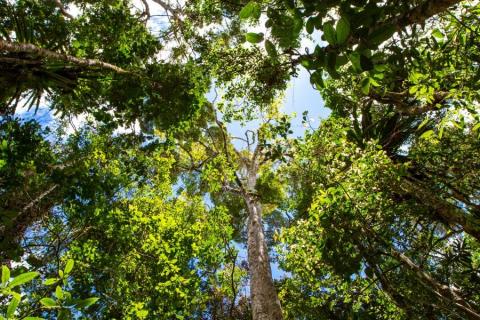What should the 2nd global assessment of biodiversity and ecosystem services examine?

Last updated 5 June 2024
IPBES is undertaking a second global assessment of biodiversity and ecosystem services. Add your expertise, ideas and topics for consideration.
This second global assessment is a sequel to the first global assessment: the most widely known and impactful report by IPBES.
Based on an initial scoping report, IPBES experts are now developing the final scoping report: it will include a detailed outline of the assessment's chapters and their topics. This final scoping report will be presented to the Plenary — the IPBES governing body composed of 146 member governments — at its 11th session in December 2024.
Sign up as an expert reviewer and make sure that your expertise, ideas and topics are considered. If you are new to reviewing and/or IPBES, please find further information on this page below. The review closes 25 June 2024.*
>> Follow the steps in the official notification (EM/2024/28)
Join an online dialogue with the IPBES Secretariat on 12 June 2024: an opportunity to discuss the second global assessment and get answers to your questions. Register as a reviewer to receive your invitation.
*Please note that IPBES has had to move the date forward from notification EM/2024/22: this page had been adjusted accordingly.
Information for newcomers
IPBES assessments
The Intergovernmental Science-Policy Platform on Biodiversity and Ecosystem Services (IPBES) is often known as "the IPCC for biodiversity".
As a major part of its work programme, IPBES provides policymakers with objective scientific assessments about the state of knowledge regarding the planet’s biodiversity, ecosystems and the contributions they make to people, as well as options and actions to protect and sustainably use these vital natural assets. These assessments may address specific themes, like for example the ongoing Nexus assessment; methodological issues, like for example the Values assessment; and both the regional and global levels, like for example the first global assessment and now the second global assessment.
The production of IPBES assessments follows a standardised process (summary). Firstly, volunteer experts compile extensive reports: researchers from a variety of disciplines, experts on Indigenous and local knowledge, policy experts, and practitioners in relevant fields. Secondly, the scientific reports are summarised for policymakers, in agreement with representatives of IPBES's 146 member countries. Both the full reports and the summaries for policymakers are freely available to the public.
IPBES draws on a wide range of sources and knowledge, and it seeks to produce reports of the highest quality. External review is therefore essential in the production of an IPBES assessment.
As a newcomer, you might also be interested in the introductory webinar to IPBES and reviewing the draft scoping report for the second global assessment, offered by Biodiversa+ on 7 June 2024.
Hints for reviewers
Please submit your comments through the submission portal, using the template provided: this ensures that your input can be efficiently processed and is properly addressed.
Expert reviewers comment on the accuracy and completeness of the scientific, technical and socio-economic content and the overall balance between the scientific, technical and socio-economic aspects of the drafts (Annex I, Decision IPBES-2/3).
According the IPBES Guide on the production of assessments, an expert reviewer evaluates the quality, validity and relevance of the assessment. The aim of an external review is to provide authors with constructive feedback that will help in preparing an assessment of the highest quality.
As a reviewer, please
- Comment in a constructive tone.
- Comment also on parts of the text that are relevant and that should stay in the text.
- Be specific and use full citations for relevant papers when providing suggestions for text revisions.
- Suggest ways to shorten text and/or display content using figures or tables.
- Focus on substantive issues (comments on spelling, text style and grammar are not needed).
- When reviewing the draft scoping report, you might want to consider the initial scoping report for the assessment. The initial scoping report has been discussed by the IPBES Plenary: in short, IPBES assessments effectively answer its member governments' questions on biodiversity and nature's contributions to people.*
Please note that
- Comments will only be accepted in English and in the given review format.
- Comments are to be given within the review deadline.
Thank you for joining the many experts who generously provide their time to IPBES: we're delighted to have you.
* IPBES now often uses the term nature's contributions to people, "an important evolution of and complement to the concept of ecosystem services." For a number of reasons, however, the earlier term ecosystem services is retained in this assessment's title.
Photo by Gregoire Dubois on Flickr: Forest of Andasibe-Mantadia National Park, Madagascar. It is home to many plant and animal species that are endemic on the island of Madagascar. This image is also available for free among the IPBES virtual backgrounds: download your copy and show your support for IPBES in video conferences.
